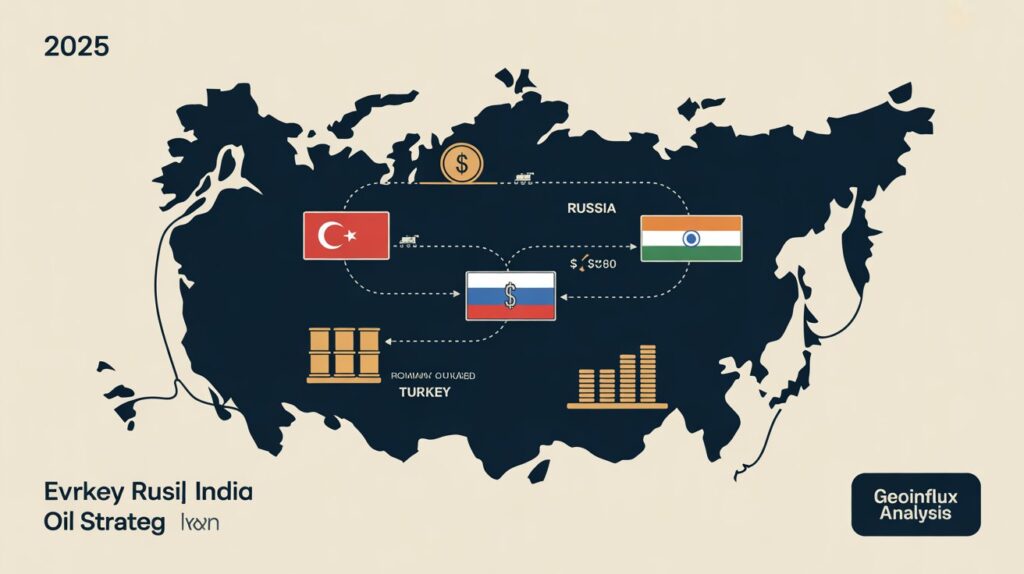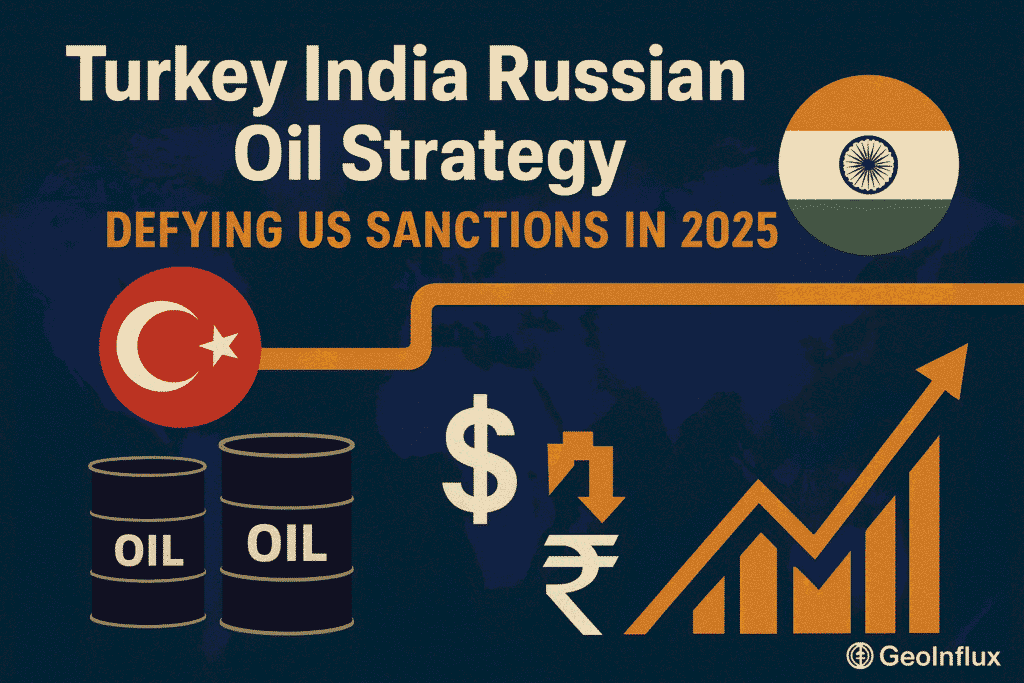Turkey India Russian Oil Strategy is reshaping 2025 geopolitics as Ankara follows New Delhi’s energy independence model, buying Russian crude despite US sanctions. Explore the 3 shocking reasons behind Turkey’s defiance and its long-term strategic bet.
What is Driving the Turkey India Russian Oil Strategy in 2025?
In a decisive turn that signals the changing nature of global power, Turkey, a core NATO member, has publicly rejected the United States’ demand to end its energy ties with Russia.
The move echoes India’s earlier defiance of Western pressure, forming what analysts now call the Turkey India Russian Oil Strategy, a model of economic realism over ideological alignment.
Both Ankara and New Delhi have demonstrated that energy independence is no longer a Western privilege. They have rewritten the script of energy diplomacy by choosing affordable Russian crude over political obedience.

This shift, far from being a symbolic act, represents a major crack in the authority of US sanctions and a milestone in the rise of the multipolar world.
How Did India Set the Blueprint for Energy Defiance?
To understand Turkey’s recent actions, one must look at India’s proven model of energy resilience. Following the Ukraine war and ensuing Western sanctions, India faced immense diplomatic pressure to stop importing Russian crude.
Instead, New Delhi doubled down, purchasing oil at deep discounts, saving billions, and shielding its economy from inflation shocks.
India’s foreign policy, rooted in strategic autonomy, refused to bend to coercion. US envoys and European leaders tried persuasion and veiled threats of secondary sanctions, but India remained unmoved.
This defiance created a geopolitical precedent: it was possible to defy Washington’s will and still thrive economically.
Western narratives tried to discredit India’s strategy through social media misinformation, suggesting a hidden retreat from Russian imports. Yet, India’s import data told the truth—it didn’t just maintain; it expanded trade.
That success directly inspired Turkey’s current approach, proving that national energy security outweighs geopolitical pressure.
Why is Turkey Rejecting US Sanctions on Russian Energy?
Turkey’s economic reality made compliance impossible. The Turkish lira has suffered prolonged devaluation, while inflation remains one of the highest in the G20. For Ankara, access to affordable energy from Russia isn’t a luxury—it’s survival.
The US recently dangled incentives, including potential relief from existing sanctions tied to Turkey’s 2017 S-400 missile defence purchase from Moscow. In exchange, Ankara was expected to sever Russian oil and gas imports. But Turkey refused.
As Energy Minister Alparslan Bayraktar stated, the nation would “buy energy from all available suppliers, including Russia.”
The timing also matters. With winter approaching, Turkey must ensure uninterrupted gas and oil supplies for households and industries. Disrupting this supply chain could cause a domestic economic crisis.
Thus, by continuing trade with Moscow, Turkey has prioritised economic stability over diplomatic appeasement, just as India did in 2023–24.
How is Courage Becoming ‘Contagious’ in Global Energy Diplomacy?
The Turkey India Russian Oil Strategy reflects a contagious form of courage, one rooted in pragmatic self-interest. India demonstrated that it’s possible to resist Washington’s demands without catastrophic fallout. Now Turkey, a NATO member, has validated that approach from within the Western camp itself.
For decades, nations feared the economic backlash of US sanctions. India broke that psychological barrier. Turkey has now institutionalised it, openly defying the same pressure despite being part of America’s own alliance framework.
This shift undermines the very foundation of the Western sanctions regime. If large economies like India and Turkey continue buying from Moscow with impunity, sanctions lose their bite. For Washington, this isn’t just defiance—it’s a public loss of leverage that weakens future coercive diplomacy.
The term “Contagious Courage” captures this perfectly. Once one major power acts independently and benefits, others inevitably follow. The West’s fear of this domino effect has now materialised.
Is a New Multipolar Energy Order Emerging?
Yes, and it’s taking shape faster than most predicted. The Turkey India Russian Oil Strategy represents the early framework of a New Multipolar Energy Order, where national interests dictate trade decisions rather than ideological alignments.
Three trends define this transformation:
- Energy Interdependence Is Rising:
As Europe heads into another winter, many countries will quietly increase purchases from Russia to secure energy stability. Sanctions are losing moral and practical credibility. - India’s Expanding Options:
Reports indicate India may resume limited purchases from Iran and Venezuela, testing Washington’s tolerance further. By maintaining multiple sanctioned suppliers, India ensures it can balance price, security, and autonomy. - Sovereignty Over Subservience:
Turkey and India’s actions create a replicable model for emerging economies. Energy security now equals national security. This doctrine is spreading across Asia, Africa, and Latin America—challenging the last remnants of US-led economic coercion.
What Are the Strategic Implications of the Turkey India Russian Oil Strategy?
The combined defiance of India and Turkey signals a power realignment in global trade diplomacy. It’s no longer about opposing the West—it’s about prioritising self-preservation.
Strategically, this means:
- Declining Western leverage: The effectiveness of US sanctions has dropped as nations find alternate trade systems (like ruble or rupee-based settlements).
- Emergence of regional energy hubs: Both Turkey and India are positioning themselves as energy corridors linking East and West.
- Shift in alliance behaviour: Non-Western powers are cooperating informally on shared economic interests, not formal military pacts.
In essence, this strategy redefines “alignment.” It’s not anti-West, it’s post-Western.
What Key Lessons Emerge from the India–Turkey Energy Parallel?
| Factor | India’s Stance | Turkey’s Stance |
|---|---|---|
| Primary Motivation | Economic savings, energy security | Inflation control, winter energy needs |
| Trade Focus | Russian crude oil | Russian oil and natural gas |
| Geopolitical Identity | Non-aligned, independent | NATO member, semi-aligned |
| Outcome | Successful defiance without punishment | First NATO country to replicate the model |
FAQs on Turkey India Russian Oil Strategy 2025
1. Why did Turkey risk defying the US on Russian oil trade?
Turkey’s decision is driven by economic necessity. Inflation has eroded household incomes, and energy costs were set to rise if Russian imports were halted. Ankara realised compliance would cause domestic unrest and industrial slowdown. Moreover, its agreements with Russia ensure a steady gas flow during winter. The government calculated that US retaliation was unlikely given Turkey’s indispensable role in NATO. The move reinforced sovereignty and positioned Ankara as a pragmatic actor, not a rebellious one. In short, Turkey chose economic survival over symbolic compliance.
2. How did India’s energy diplomacy influence Turkey’s strategy?
India’s example gave Turkey a blueprint for safe resistance. New Delhi’s success in maintaining Russian oil imports without facing sanctions proved that Washington’s threats had limits. Turkey observed India’s resilience—how it used discounted crude to tame inflation, boost refining margins, and strengthen the rupee. This success reshaped global perceptions. Ankara realised that if India, a major democracy with strong Western ties, could withstand pressure, so could it. Thus, Turkey didn’t imitate India blindly; it adapted India’s energy diplomacy model to its own economic realities.
3. What impact will this defiance have on NATO cohesion?
Turkey’s stance complicates NATO’s unity. While the alliance views Russia as a primary adversary, Ankara’s dependence on Moscow for energy makes a total cutoff impossible. This creates policy friction with the US and European members. However, Turkey’s geographic importance—controlling the Black Sea access and mediating in regional conflicts—makes it irreplaceable. NATO may express disapproval but won’t risk alienating Ankara. The situation reveals the limits of alliance discipline when economic survival is at stake.
4. Does this mean US sanctions power is declining globally?
Yes, significantly. Sanctions depend on global compliance and dollar dominance. Both are eroding. As India and Turkey diversify payment systems (settlements in local currencies or rubles), the US loses enforcement reach. The world is witnessing the de-dollarisation of energy trade in slow motion. Once major economies find profitable ways to bypass sanctions, the deterrent effect collapses. The Turkey India Russian Oil Strategy is the most visible proof of that decline.
5. Could this strategy inspire other nations to defy US pressure?
Absolutely. Countries in Asia, Africa, and Latin America are watching closely. Many face similar inflation and energy dependency issues. India and Turkey’s success signals that defiance can be safe and profitable. Nations like Indonesia, South Africa, and Egypt may soon adopt similar policies—balancing ties with the West while trading freely with sanctioned states. The precedent is powerful: economic pragmatism now outweighs ideological obedience.
How Does This Strategy Reshape Global Power Equations?
The Turkey India Russian Oil Strategy has transformed the concept of sovereignty in modern geopolitics. It represents a shift from reactive diplomacy to proactive economic statecraft.
By asserting their independence, both nations have demonstrated that global influence now stems from energy access—not military alliances.
For Washington, this defiance is a wake-up call. For the Global South, it’s a roadmap.
References
- Reuters: Turkey to Keep Buying Russian Energy Despite US Sanctions Pressure
- Al Jazeera: India’s Russian Oil Imports Surge Despite Western Criticism
- Anadolu Agency: Turkish Minister Confirms Continued Oil Purchases from Moscow
- Bloomberg Energy: Sanctions Losing Bite as Global South Finds Alternatives





Heya i am for the primary time here. I found this board and I in finding It really helpful & it helped me out a lot. I am hoping to provide something again and help others such as you helped me.
Pingback: World On Edge: Is The US Nuclear Test Comeback Pushing Us Toward World War 3? GeoInflux